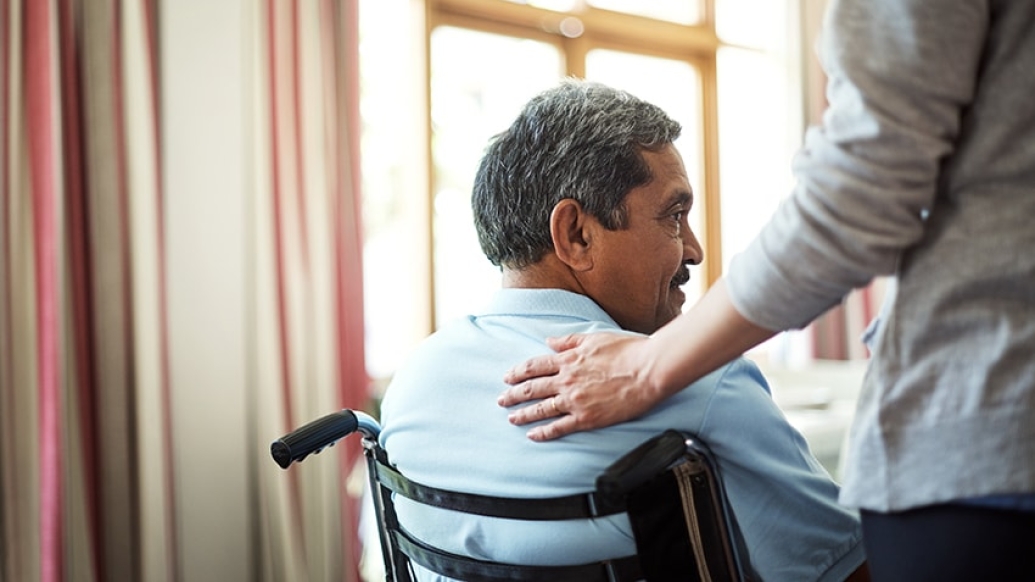Helping a person with Lewy body dementia navigate the hospital requires caretakers to be advocates and educators. One woman offers strategic advice.
1:00 PM
Author |

Whether it's a brief trip to the emergency department or an overnight stay, time in the hospital can make anyone anxious.
MORE FROM MICHIGAN: Sign up for our weekly newsletter
But for patients with Lewy body dementia, that experience can be overwhelming — or even deadly.
That's what Annette Kaufman learned when her husband of more than 50 years, Barry, required hospitalization. Barry has Lewy body dementia (LBD), a brain disease that impairs thinking and mobility.
About 20 percent of patients with dementia have LBD, making it the third most common type of dementia after Alzheimer's disease and vascular dementia.
A person with LBD may experience one or more disturbing and debilitating symptoms, including cognitive difficulties, visual hallucinations, acting out dreams, stiffness and slow movement. They might also have tremors, fainting, poor balance, falls and periods of unresponsiveness.
Which is why even a short hospital visit can be highly stressful.
Another reason for concern: Many health care providers, including those working in large hospitals, aren't familiar with LBD and how to address its symptoms.
Based on her experience, Kaufman offers the following tips for helping a loved one with LBD receive safe, appropriate care in the hospital:
How to help a Lewy body dementia patient during a hospital visit
Bookmark this website on your smartphone: Become familiar with the Lewy Body Dementia Association (LBDA) website and use it as a resource for yourself and others. The site has a wealth of information about the disease, including a glossary that lists medication sensitivities and terms.
Be prepared to educate everyone — even doctors. "I can't tell you how many doctors have told me that they've never heard of LBD," says Kaufman. "For times like that, I'm never without extra LBDA brochures."
Information from an established authority, she notes, can help thwart any defensiveness from medical professionals.
Carry an LBD Medical Alert Card (and other key information): This handy wallet card, available through the LBDA website, quickly identifies your loved one's condition to medical professionals. The card also describes LBD symptoms and provides critical information about potentially life-threatening medical sensitivities.
SEE ALSO: My Lewy Body Dementia Journey with the Love of My Life
In addition, keep a record of the patient's medical history, medications and allergies. Keep it current (maintaining it on a computer makes updating easier), and always carry a printed copy.
Know what medications could be problematic: Although LBD shares many symptoms with Parkinson's and Alzheimer's diseases, some medications used for those patients — as well as over-the-counter medications such as Benadryl — could be dangerous for people with LBD.
Haldol (haloperidol) and other antipsychotics sometimes prescribed to treat other dementias can be fatal for LBD patients. "As an added precaution, I actually list Haldol and other neuroleptics on Barry's allergy list," Kaufman says.
The LBDA website has a detailed glossary listing medications used to treat a range of physical, cognitive and behavioral symptoms. Notes Kaufman: "I carry a printed copy of this glossary on which I've highlighted all of the medication warnings."
Assemble a 'grab and go' bag: In the event your loved one must be hospitalized, Kaufman recommends having the essentials ready. Among those items: a patient's medical history, a list of current medications and allergies, and extra copies of the LBDA literature described above.
Kaufman also suggests packing all medications in their original bottles and bringing contact information for all doctors. "Don't forget any overnight necessities you might need," she adds, "including your own medications."
Plan ahead for surgical procedures: Consult with the patient's neurologist before any recommended nonemergency surgical procedures, because both anesthesia and pain medications can have negative effects on someone with LBD. Encourage the surgeon to work closely — and early on — with the anesthesiologist to avoid drug interactions.
"Often, the patient and family do not meet the anesthesiologist until right before a procedure," explains Kaufman. "That leaves too little time to discuss options."
Whenever possible, pain blocks are preferable for LBD patients. General anesthesia can worsen LBD symptoms.
Never hesitate to speak up: Kaufman recalls a time when she and Barry spent several hours in the emergency department waiting to be admitted. "It became time for his Sinemet (a medication used to treat motor symptoms), but they kept saying we needed to wait until he was moved into a room," she says. "I finally gave the nurse 10 minutes before I would give him the medication myself. In the end, that's what happened."
In another instance, "an anesthesiologist once told me he had not heard of LBD," Kaufman says. "He grew quite defensive when I brought up medications that should not be used with LBD patients. Again, I had to stand my ground and be both an educator and an advocate."

Explore a variety of healthcare news & stories by visiting the Health Lab home page for more articles.

Department of Communication at Michigan Medicine
Want top health & research news weekly? Sign up for Health Lab’s newsletters today!





